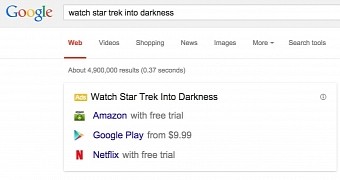Google has been getting slammed for years for not doing “enough” to fight against piracy, even though, as a search engine, it is bound to offer people what they’re looking for.
A couple of years back, Google released what’s been known as the Pirate Update, which is a system the company uses to penalize sites that are seen as violating copyright laws. Now, the company has announced that it will be rolling out an update of this algorithm next week, along with some new ad and editorial formats that it hopes will slow down the piracy train.
The Pirate Update is basically a filter, much like its other algorithms used in Google Search – Panda and Penguin – that goes through all sites indexed by Google and downgrades those that are in violation.
There’s a catch, however, the sites that are found to be in violation will remain downgraded even if they fix things until the next update is run.
“Today we’re publishing a refreshed How Google Fights Piracy report, which explains how we combat piracy across our services. This new version updates many of the numbers from the 2013 version and lists a few other developments in the past year,” reads a Google blog post.
New ads to go with the effort
The company has revealed that it has been testing a new ad format in search results in queries related to music and movies to help people find legitimate sources of media. Those who are looking for such content, mixed with a few key words such as “download,” “free,” or “watch,” have started seeing some new ads at the top of the page, sending people to services such as Amazon, Netflix or Google Play.
They’ve also started testing other ways of pointing people to legitimate sources of music and movies including in the right-hand panel on the results page, in what is known as a Knowledge Graph. While these results are currently being displayed in the US only, the company plans to expand them internationally.
“In August 2012 we first announced that we would downrank sites for which we received a large number of valid DMCA notices. We’ve now refined the signal in ways we expect to visibly affect the rankings of some of the most notorious sites. This update will roll out globally starting next week,” writes Katherine Oyama, Google’s senior copyright policy counsel.
Since Google is such a popular recipient of DMCA notices, with record numbers getting sent every new week, the company has also decided to start removing more terms from autocomplete, based on these removal notices. “We’ve begun demoting autocomplete predictions that return results with many DMCA demoted sites.”
Google notes that its partnership with the entertainment industry deepens every day. Aside from special promotional content and YouTube’s Content ID, Google intends to continue to invest in combating piracy across all services.

 14 DAY TRIAL //
14 DAY TRIAL //